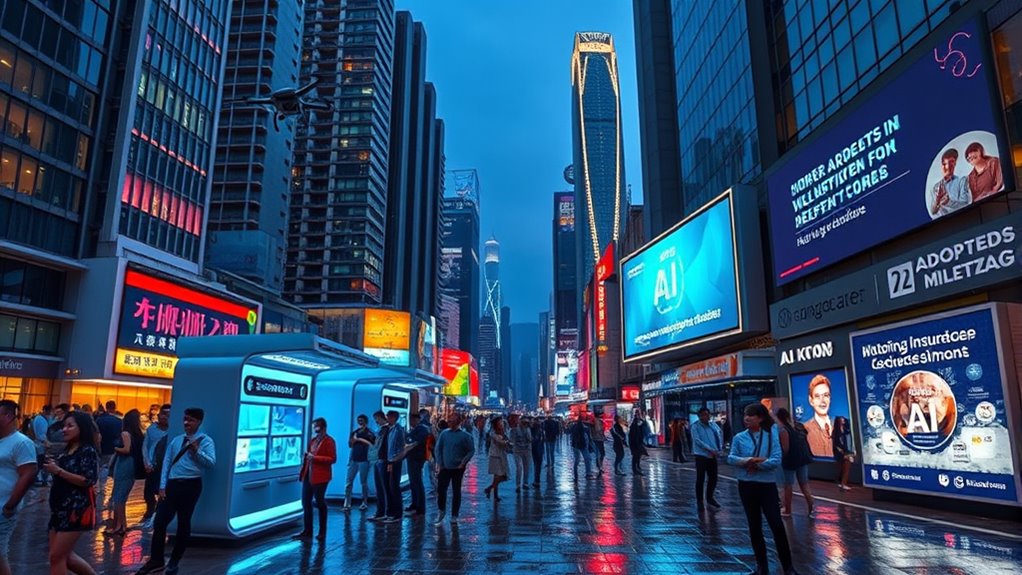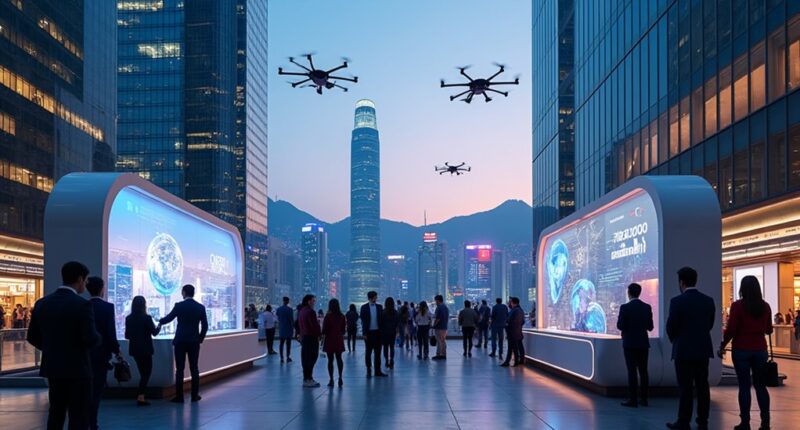Hong Kong plans to adopt AI in over 200 public and private services by 2027, including data analysis, customer support, licensing, and permits. This initiative aims to boost efficiency, responsiveness, and digital transformation across sectors. Businesses and residents are already experiencing benefits from AI-powered chatbots and personalized services. If you want to discover how these changes will impact your daily life and future opportunities, continue exploring this exciting shift toward innovation.
Key Takeaways
- Over 200 public service procedures in Hong Kong aim to integrate AI by 2027, focusing on efficiency and digital transformation.
- By 2026, approximately 100 procedures will be AI-deployed, including data analysis, licensing, and customer service.
- The government, guided by the AI Efficacy Enhancement Team, promotes sector-wide AI adoption across public services.
- AI deployment enhances responsiveness, streamlines processes, and supports innovation in government operations.
- The initiative aligns with Hong Kong’s broader strategy to position as an AI-driven innovation hub.

Have you ever wondered how artificial intelligence is transforming Hong Kong? The city is on a clear path to integrating AI into over 200 public service procedures by 2027. This ambitious plan aims to make government operations more efficient, responsive, and tech-driven. By 2026, about 100 procedures will be targeted for deployment, focusing on areas like data analysis, customer service, and licensing or permit approvals. These efforts are guided by a high-level AI Efficacy Enhancement Team, which includes senior officials and private sector experts. Their role is to guarantee the city’s digital transformation is smooth and impactful, positioning Hong Kong as a leader in the AI industry. The government actively encourages sector-wide AI integration, welcoming global tech firms to participate, which boosts the city’s reputation as a hub for innovative digital menu solutions.
Hong Kong aims to automate over 200 public services by 2027, enhancing efficiency and positioning as an AI innovation hub.
As an everyday consumer, you’re already seeing AI’s influence. About 65% of residents use AI for personalized shopping tasks, like searching for products, tracking orders, or making reservations. Conversational AI has become familiar, making interactions with customer service faster and more natural. AI enhances your shopping experience by personalizing recommendations and streamlining the buying process, especially during the awareness and consideration stages. Many businesses recognize AI’s importance, with 79% acknowledging AI agents as key to shaping consumer purchasing decisions. These AI tools support 24/7 customer service, reducing wait times and improving satisfaction. For you, this means a more efficient, tailored shopping journey that fits your schedule and preferences. AI’s impact isn’t just for consumers; it also helps businesses stay competitive by automating repetitive tasks and offering innovative services.
The market for AI in Hong Kong is booming. It’s projected to reach around US$937 million by 2025, with rapid growth driven by advances in robotics, autonomous tech, computer vision, machine learning, natural language processing, and generative AI. As a tech-savvy city, Hong Kong’s population embraces AI-powered chatbots, virtual assistants, and tailored e-commerce solutions. This demand is fueled by a cultural emphasis on efficiency and convenience, evident in smart homes and smart transport systems. Consumers expect seamless, tech-enabled experiences, which encourages more businesses to adopt AI tools.
The government’s support plays a vital role. Nearly HK$1 billion is allocated to establish the Hong Kong AI Research and Development Institute by 2025–26. The city’s innovation funds have increased support for R&D, and partnerships like the one between HKSTP and Alibaba have led to the creation of the Hong Kong AI Lab. Ethical concerns around privacy and transparency are also addressed through policies like the AI-focused data protection framework introduced in June 2024, aligning with global governance efforts. Additionally, financial institutions are encouraged to adopt AI to improve anti-money laundering measures, which could generate an estimated HK$83 billion growth in the financial services and insurance sectors. Overall, AI’s integration is reshaping Hong Kong’s economy, public services, and everyday life, making the city more efficient, competitive, and innovative.
Frequently Asked Questions
How Will AI Impact Employment in Hong Kong’s Service Sector?
AI will transform employment in Hong Kong’s service sector by automating routine tasks, which may displace some jobs like customer service and admin roles. However, it’ll also create new opportunities in AI development, oversight, and ethical governance. You’ll need to upskill in digital literacy and AI tools to stay competitive. Embracing ongoing training will help you adapt to these changes, focusing on complex problem-solving and human-centered tasks AI can’t replace.
What Measures Are in Place to Ensure AI Data Privacy?
You’re protected by Hong Kong’s data privacy laws like the PDPO, which set strict rules for AI data use. For example, if you’re using AI in healthcare, organizations must minimize data collection and guarantee human oversight. They also follow guidelines like the PCPD’s checklist, implement internal controls, and use risk-based measures. These steps keep your personal data safe while enabling responsible AI deployment across sectors.
Will Small Businesses Have Access to AI Adoption Support?
Yes, small businesses will have access to AI adoption support. The government offers targeted programs like AI proof-of-concept funds, grants, and tax incentives to lower financial barriers. Additionally, systematic training programs and industry collaborations aim to build your internal AI skills. Public-private partnerships and specialized consultancies provide further guidance, making it easier for your business to adopt AI smoothly and confidently, even if you’re new to the technology.
How Is AI Training Provided for Local Service Workers?
AI training for local service workers is like building a bridge to the future. You’ll find a mix of online and in-person programs, offering flexibility and hands-on experience. Many companies provide webinars, virtual classrooms, and practical workshops through organizations like HKPC. Despite challenges like technical gaps, efforts focus on upskilling, supported by government initiatives and industry partnerships, ensuring you stay competitive and ready for AI-driven changes in your workplace.
What Are the Environmental Impacts of Deploying AI at Scale?
Deploying AI at scale considerably impacts the environment by increasing energy consumption, mainly from data centers fueled by fossil fuels. You’ll contribute to higher carbon emissions, as AI interactions emit CO₂ and demand more electricity. Additionally, hardware manufacturing and disposal generate e-waste and deplete natural resources. To minimize these effects, prioritize renewable energy use, support energy-efficient technologies, and advocate for responsible recycling and transparency in AI’s environmental footprint.
Conclusion
By 2027, Hong Kong’s ambitious AI adoption aims to accelerate services, amplify automation, and advance innovation. As you witness this wave of wonder, you’ll want to watch how these transformative technologies turn traditional tasks into trailblazing triumphs. Embrace the exciting evolution, stay savvy about the shifts, and see how smart solutions shape a brighter, better bustling city. Hong Kong’s horizon is humming with hope, heralding a new era of intelligent ingenuity.









